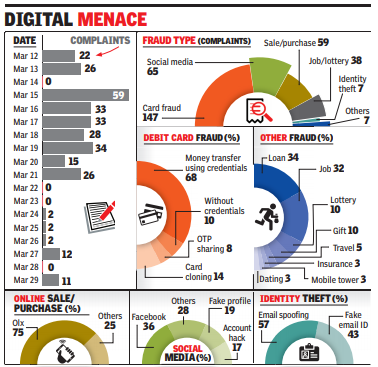
PUNE: The city has witnessed a major drop in crime rate during the lockdown, but cybercrooks have continued to target people, police data show.

While conceding that the number of cybercrime complaints was far less than the monthly average, Pune police said it still accounts for the lion's share of crime-related instances in the wake of the Covid-19 outbreak.
In March, the police received 639 complaints - mostly relating to debit/credit card, online marketing, online insurance, job and lottery fraud and social media crime. The previous month, 1,085 complaints were lodged, while in January, 986 people complained.
Over the course of 2019, the cyber police had received a total of 7,795 complaints.
Additional commissioner of police (crime) Ashok Morale attributed the drop to the lockdown, which has restricted the movement of cyber criminals in hotspots like Noida, Delhi, Kolkata, Rajasthan and Jharkhand. "Also, police action on illegal call centres in places like Delhi has contributed to the drop," he said.
Between March 12 (when the initial Covid-19 positive cases were reported in the city) and March 29, the police received 305 complaints. "We are conducting an inquiry into all 305 complaints, but no offence has been registered yet," Morale said.
The ACP said most cybercrime is committed outside the state and even the country. "It is imperative that we create awareness among the public. We have formed dedicated teams for this purpose. People must be on their guard, even though crooks use innovative methods. If we are vigilant, cybercrime will drop on its own," Morale said.
"The average number of daily complaints to the cybercrime police station has dropped to three-and-a-half," deputy commissioner of police (cyber) Sambhaji Kadam told TOI.
An official from the cyber police station said educated youths from Bihar and Uttar Pradesh, most of whom work at illegal call centres, have returned home after the virus outbreak - one reason for the drop in such crime. "That said, Puneties continue to receive calls from fraudsters impersonating bank officials, urging them to upgrade KYC details and share their OTPs, among other details," the officer said.
"Fraudsters have launched apps and websites and send links related to coronavirus to fool people into transferring money," cybersecurity expert Niranjan Reddy said, adding, "They cheat people by sending messages regarding coronavirus tests, donations to buy ventilators for patients, or even giving money to the PM's or CM's relief funds. People are keen to help and fall prey."

While conceding that the number of cybercrime complaints was far less than the monthly average, Pune police said it still accounts for the lion's share of crime-related instances in the wake of the Covid-19 outbreak.
In March, the police received 639 complaints - mostly relating to debit/credit card, online marketing, online insurance, job and lottery fraud and social media crime. The previous month, 1,085 complaints were lodged, while in January, 986 people complained.
Over the course of 2019, the cyber police had received a total of 7,795 complaints.
Additional commissioner of police (crime) Ashok Morale attributed the drop to the lockdown, which has restricted the movement of cyber criminals in hotspots like Noida, Delhi, Kolkata, Rajasthan and Jharkhand. "Also, police action on illegal call centres in places like Delhi has contributed to the drop," he said.
Between March 12 (when the initial Covid-19 positive cases were reported in the city) and March 29, the police received 305 complaints. "We are conducting an inquiry into all 305 complaints, but no offence has been registered yet," Morale said.
The ACP said most cybercrime is committed outside the state and even the country. "It is imperative that we create awareness among the public. We have formed dedicated teams for this purpose. People must be on their guard, even though crooks use innovative methods. If we are vigilant, cybercrime will drop on its own," Morale said.
"The average number of daily complaints to the cybercrime police station has dropped to three-and-a-half," deputy commissioner of police (cyber) Sambhaji Kadam told TOI.
An official from the cyber police station said educated youths from Bihar and Uttar Pradesh, most of whom work at illegal call centres, have returned home after the virus outbreak - one reason for the drop in such crime. "That said, Puneties continue to receive calls from fraudsters impersonating bank officials, urging them to upgrade KYC details and share their OTPs, among other details," the officer said.
"Fraudsters have launched apps and websites and send links related to coronavirus to fool people into transferring money," cybersecurity expert Niranjan Reddy said, adding, "They cheat people by sending messages regarding coronavirus tests, donations to buy ventilators for patients, or even giving money to the PM's or CM's relief funds. People are keen to help and fall prey."
Coronavirus outbreak
Trending Topics
LATEST VIDEOS
City
 Covid-19: Elderly man quarantined in boat in West Bengal's Malda
Covid-19: Elderly man quarantined in boat in West Bengal's Malda  COVID-19: 108 patients in national capital are Jamaat attendees, says Delhi CM Arvind Kejriwal
COVID-19: 108 patients in national capital are Jamaat attendees, says Delhi CM Arvind Kejriwal  9000 Tablighi Jamat workers and their contacts have been identified: Home Ministry
9000 Tablighi Jamat workers and their contacts have been identified: Home Ministry  Govt employee commits suicide over fear of Covid-19 in UP's Saharanpur
Govt employee commits suicide over fear of Covid-19 in UP's Saharanpur
More from TOI
Navbharat Times
Featured Today in Travel
Quick Links
Kerala Coronavirus Helpline NumberHaryana Coronavirus Helpline NumberUP Coronavirus Helpline NumberBareilly NewsBhopal NewsCoronavirus in DelhiCoronavirus in HyderabadCoronavirus in IndiaCoronavirus symptomsCoronavirusRajasthan Coronavirus Helpline NumberAditya ThackerayShiv SenaFire in MumbaiAP Coronavirus Helpline NumberArvind KejriwalJammu Kashmir Coronavirus Helpline NumberSrinagar encounter
Get the app





